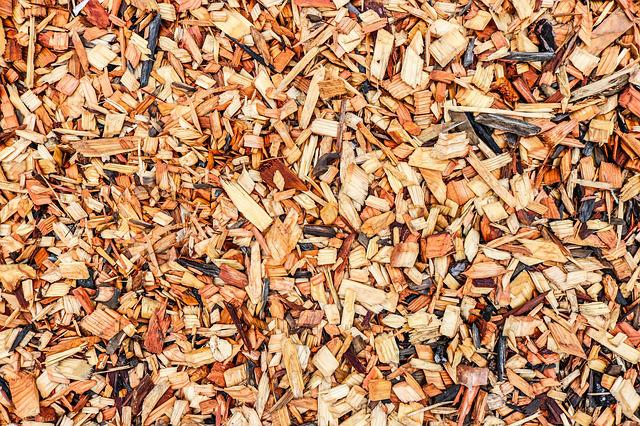Mulching offers many benefits to your garden plants and the soil in which they grow. Not only does much insulate plants from extreme heat by regulating soil temperature, but it also holds soil moisture. The fall and early winter are the best times to mulch your flower garden bed. Check out six ways mulch materials can benefit your yard in Alexandria, VA.
1. Control Weeds
The first benefit of applying mulch to your garden or flower bed is that it can suppress weeds by limiting the amount of sunlight that penetrates the undergrowth to the weeds. Limiting sunlight makes it difficult for weed seeds to grow and breakthrough. Without adequate sunlight, the number of weeds that grow in open areas of your garden will decline.
One fantastic choice of material to kill grass or weeds is corrugated cardboard. Multiple layers of newspaper are a potent option as it creates a surface that won’t allow sunlight to infiltrate. Newspapers and cardboard won’t interfere with plants’ health or growth. After covering the yard, lay a couple of inches of mulching material right on top.
2. Prevents Soil Erosion
As well as trapping moisture on the soil surface, mulching also keeps rainwater from washing away the soil in your vegetable garden. It slows down the fall and impact of rainwater, lessening its intensity as it hits the ground. Water will seep and then flow away without disrupting the soil structure.
3. Conserve Soil Moisture
Dry summer conditions can take a toll on evergreens, young trees, and shrubs, leading to stunted growth and drying. The good news is that organic mulch absorbs and holds water for several days. Covering the soil with mulch also limits evaporation on sunny days or windy winter months. Not to mention, mulching helps prevent soil cracks from forming and exposes delicate roots to freezing temperatures.
4. Controls Pests
Laying mulch over your flower beds and garden can help deter certain pests. Cedar mulch contains natural oils that act as insect and pest repellants. To ward off pests, use mulch that has a strong fragrance. Reflective, silver-colored plastic mulch can help reduce the population of arthropods, especially spider mites, thrips, and whiteflies. The reflection from the plastic mulch also dazes and repels pests, and is a much more effective deterrent than insecticides.
5. Maintains Soil Nutrients
Mulching helps preserve the soil’s nutrients from being washed away in a downpour and ensures their slow release in the flower or garden bed. This usually happens when organic matter starts decomposing on top of the soil. Wood, bark chips, pine needles, and straw can also introduce nutrients to the soil when they decompose. This helps promote a healthy growth cycle within the garden.
6. Encourages Beneficial Insects
Another benefit of applying organic mulch to your garden is that it encourages earthworms to inhabit the garden soil, where they can improve soil structure and contribute to nutrient cycling. Centipedes eliminate all types of soil-dwelling pests such as slugs, while millipedes and sowbugs break down organic matter. A natural part of the garden, slugs help decimate the bug population. They feed on harmful beetles, mosquitoes, caterpillars, and flies.
Organic or Inorganic Mulches?
Organic mulch—wood chips, leaves, tree bark, and pine needles—can help control pests, minimize weed growth, and retain moisture for plants. Wood or bark chips are made from shredded cedar or pine trees. The good thing about organic mulch made from wood is that it decomposes faster and rarely gets washed away during heavy rains.
Compost, or shredded leaves, is another popular choice for gardeners. If you settle for dark organic mulch, make sure the material is mold-free. When laying mulch, ensure it doesn’t contact any wood in the home or any other structure. Avoid compost material treated with pesticides, as the chemicals will seep into the soil and harm your plants.
You can easily find bark and wood chips in bags at local hardware stores or gardening centers. Compost and shredded bark are also sold in the foregoing places. If you want to save money, you can create homemade compost from leaf matter or grass clippings from your yard. Organic mulch can be a fantastic option as it provides extra nutrition to plans and may suit those who don’t mind spending a bit more time maintaining it.
Organic and inorganic mulch come in various sizes and shapes, ranging from fine pieces that are easy to lay to large, coarse pieces for large outdoor spaces with bigger plants, shrubs, and trees. Fine mulch works best for walkways and areas with no plants, as they don’t allow a lot of water or air to reach the soil. Coarse mulch typically lasts longer than fine mulch and will allow more air, water, and nutrients to pass through to the soil. On the flip side, they can wash away faster in heavy rains.
Inorganic mulch is a good option for a hands-off approach to gardening. What they lack in nourishing qualities, they make up for it with their visual appeal and affordable pricing. If you decide to go with inorganic mulch, consider options such as volcanic rock, plastic, or various stones.
Want to Apply Organic Mulches to Your Yard to Suppress Weed Seeds? We can help!
Mulching is a sustainable practice that can improve soil health and fertility, promote plant productivity, regulate soil temperatures, encourage beneficial insects, and help with weed suppression. Improper mulching can ultimately cause plant diseases and exert pressure on your plants—the same problems it’s meant to avert. It’s advisable to work with an expert who understands mulching best practices and mulching materials to avoid harming your plants. Whether you want to improve soil fertility or soil moisture retention, the team at Dos Amigos Tree can help you with your mulching goals. We take pride in having a passionate and experienced team that can offer timely and professional services to transform your outdoor area.



